We are delighted to announce the shortlists for the 2022 Michael Marks Awards for Poetry Pamphlets
The shortlisted poets and publishers, alongside the winning illustrator and Environmental Poet of the Year, will appear at our annual awards evening.
The event will take place on Friday December 9th, at the British Library (please note that this is a new date, because of nationwide rail strikes).
The event will be open to the public and will be free to attend. It will also be live-streamed. Tickets must be booked in advance, and seats at the British Library will be limited. We will update this page when tickets are available.
The Michael Marks Poetry Award Shortlist
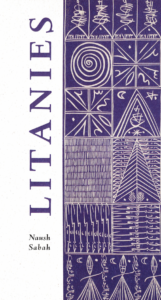
Naush Sabah – Litanies (Guillemot Press)
Judges’ Comments
There’s a clue in the title: a litany is a shared petition to God, a call and response, so to speak, so we know from the beginning that this pamphlet intends to involve us all. These are feisty, outraged and outrageous poems, tracing a woman’s path through spiritual uncertainty. The poems are enriched with Arabic and Sufi text to remind us that sometimes the English language alone cannot be sufficient. We were struck by the sheer boldness of the narrative – it’s deliberately confrontational stance, addressing colonial exploitation, anthropocentric religion, the role of women in Islam, and the uncomfortable balance of visceral and spiritual desires. Above all, it was the sheer beauty of the language and the skill with which the individual poems were crafted which impressed us so much. These stunning, apostatic odes bear an importance which will endure far beyond the confines of the pamphlet that holds them.
SESTINA FOR SALAH
Before Bebo can speak or stand
the call to prayer is raised;
her skin, paper-thin, rolls and folds
when father whispers with head bowed:
‘Before your death, you should prostrate.’
The world teaches her to kneel.
Soon she paws at things, crawls and kneels,
stretches arms out to where he stands,
starts to mimic when he prostrates;
climbing upon his back, she’s raised
like speech taught to believe and bow;
to be a thread within the fold.
And as a child it’s fun to fold
those dazzling clothes, get down and kneel
for hands of henna, hair in bows,
and wait for the ehlan, then stand
as rice cooks and laughter raises
happy voices that won’t prostrate.
In teenage gloom she’ll fall prostrate.
At night her secrets fold
into her quiet, no one to raise
her spirits; she’ll turn to God and kneel.
When cuts and cries don’t heal, she’ll stand
in tahajjud keeping her head bowed.
With womanhood her faith begins to bow
before fiqhi flaws and prostrate
minds that refuse to think or stand
against doubt she’s been taught to fold
up inside and ignore. ‘We kneel.
God is Most High so don’t raise
objections. He can hew those He’s raised.’
Now a mother, she commits and bows,
devotes herself, again she kneels
to seek kashf so doubt prostrates
to need and allows her into the fold
where saintly souls and prophets stand.
She bows. Submission enfolds;
now her daughter prostrates and kneels
while Bebo wonders if she might stand, might rise.
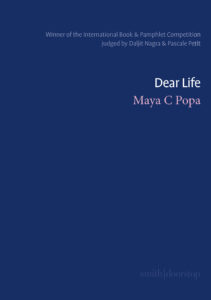
Maya C Popa – Dear Life (smith | doorstop)
Judges’ Comments
Some good poems wear out with the reading while others have a cumulative effect on the reader – they quietly impress and with each subsequent reading acquire fresh depths and unexpected resonances. Dear Life is one such pamphlet. These are poems of transfiguration and transformation which exude meaning and significance and enthral the reader. Popa is a bold writer – she doesn’t shy away from expansive, dangerously poetic words such as love, God, life and beauty, but turns them relentlessly to her own ends. Dear Life is, in effect, a book of uncommon prayer – haunting and celebratory. Poems which demand to be remembered and enlarge us as we read.
Dear Life
I can’t undo all I have done unto myself,
what I have let an appetite for love do to me.
I have wanted all the world, its beauties
and its injuries; some days,
I think that is punishment enough.
Often, I received more than I’d asked,
which is how this works—you fish in open water
ready to be wounded on what you reel in.
Throwing it back was a nightmare.
Throwing it back and seeing my own face
as it disappeared into the dark water.
Catching my tongue suddenly on metal,
spitting the hook into my open palm.
Dear life: I feel that hook today most keenly.
Would you loosen the line—you’ll listen
if I ask you,
if you are the sort of life I think you are.
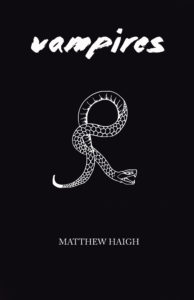
Matthew Haigh – Vampires (Bad Betty Press)
Judges’ Comments
Vampires is a piece of trip literature. Fuelled by the infinitely reproducible goods of sweets and plastic figurines, it plunges into the heady themes of childhood, queerness, self-image, and grief. Haigh’s speakers praise the love of an aunt who was always in their corner, “in the steam from a Sunday roast, in the seat / of your love, in the rolling combs of light”. The poems fizz with the camp and the kitsch, Barbie and My Little Pony dolls (“relic of god”), the schlocky conventions of horror which “flickered in the tides / of my face”, and ultra-processed glucose: blood is transubstantiated into Cherry Slush Puppy, and grief into nineties nostalgia, where all “toys were toxic and smelled fucking great”.
Hologram
Memory, you are an absent father. When you open a suitcase to remove sheaths of glass lit with holograms, shuffle and spread them before me, I cannot trust you. I was not always so sweet. She once shrank in the doorway from my poison tongue. What demonic enzyme was it swam inside her that we could not reach – could not burn or burst with loving words. I believed that just by fizzing around wild and aglow like all children I might convince her to live for me. In the garden, after dark, she piled on more hot dogs – each one a thick meat bullet sizzling with her name.
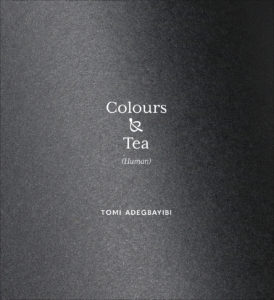
Tomi Adegbayibi – Colours & Tea (Human) (Muscaliet Press)
Judges’ Comments
The cover of Tomi Adegbayibi’s Colours & Tea (Human), published by Muscaliet Press, is fuzzy black; this is followed by a pine-green fibrous endpaper. Both choices are made by the author. We open the first poem and we are in a forest; next we come home and make tea. “We are born and we die. Everything else is hazy, human, and hazy.” What comes in between these forest green and deep black brackets is a poetic journey in which the delicate attention with which one brews and sips tea is unflinchingly brought to the situations of human terrors and agonies. The syntax uncurls as a tealeaf and the images whirl; Tomi Adegbayibi’s voice comes through blazing with sympathy and vigour.
LEMON & GINGER
Bring the water and ginger to boil.
Simmer. A lemon slice to breathe.
The same treatment for a man’s mind, for a gentler brew.
The zest reduces the bitter tannin.
Citrus and its fruits are scarce here,
Nothing organic can grow from the floor of prison cells.
To prevent before a cure,
catch a child before he is something else. Strain the root.
Frustration to leave through the kettle spout.
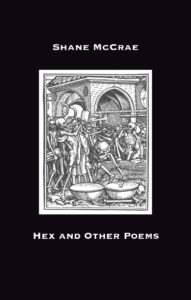
Shane McCrae – Hex and Other Poems (Bad Betty Press)
Judges’ Comments
Hex and Other Poems recalls T.S. Eliot’s Four Quartets. It has the same looping, questing impulses, the same incantatory properties. Here McCrae reprises some of the themes of his other, award-winning work – race-making, mixed race identity, the deep past of racial trauma – but over the course of a mere nine poems. McCrae’s lines are pulled into whorls of meaning, and sent spinning out again, like galaxies. The questions of this work – how to contemplate the past, the appropriate ways to appeal to and commune with one’s ancestors – go marching into the rich dark, and, when they get there, clap back. McCrae’s long poems are ideally suited to the pamphlet form, offering as they do the perfect dose of astral travel.
The White People in My Blood
What do I know about the white
People I don’t know in my blood
Does their blood pale my father’s where
It meets his blood
Where in my body does the pale
Blood meet the dark blood? In my heart
How red might it have been were my
Blood pure, my heart
Which red? How much of which red red
A pale red, or a dark red, blood
Red, heart red? White blood white as blue day
In the heart, black blood
In the heart, black as the breathing sundown
My father’s father’s father’s heart
Might all day long have pounded toward
Then through, whose heart
Kept him awake and running all
Night, might have, or his father’s blood
Rushing, if either ran. Who runs
Still in my blood
Who chases? Whose blood darkens where
They meet? Who fights still in my heart
For what? What violence is the beat-
ing of my heart
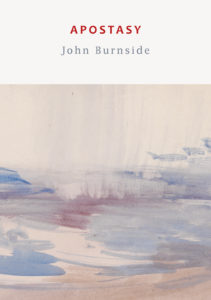
John Burnside – Apostasy (Dare-Gale Press)
Judges’ Comments
The word that sings most yearningly in Apostasy is ‘nothing.’ We might have met that particular nothing in an older essay, where John Burnside speaks, in a flurry of tender, reticent dependent clauses, about the lovers at a point of their separation by death being granted a glimpse of “an extraordinary nothing that steadies the world.” The pamphlet explores the possibilities of disavowals and negations; yet the poetry’s effect is a manifestation of various miraculous presences, whether in the shimmer of the optative or in the radiance of the counterfactual. Perhaps apostasy should be understood simply as standing away, a step out of oneself, a viewpoint that allows seeing both the touching fiction of what there is and an ambiguous glory of what could have been.
A Footnote to Colossians
For ye are dead, and your life is hid
St Paul
Let us remember
the stillborn: how they
cede their places here
with such good grace
that no one ever
speaks of them
again.
In school,
we placed them, carefully,
in Limbo,
deep in the folds of smoke
and snowfall, where
their names would never
find them:
pagan, now,
and immaterial,
like phantoms,
or that
boy I sometimes saw
in polaroids,
the one they said
was me.
The Michael Marks Publishers' Award Shortlist
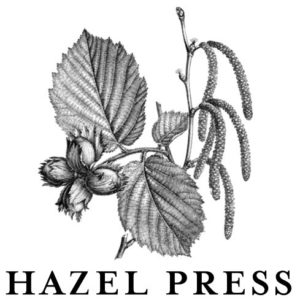
Judges’ Comments
A relatively new publisher on the scene, Hazel Press has made an impact on this year’s judges with their strong ethos and focus on the environment and our current climate crisis. All of their pamphlets demonstrate careful attention to details and a dedication to best represent their authors, while showcasing new and established voices in environmental, feminist and artistic poetry. Beyond the content of the poems, Hazel Press’ environmental credo is reflected throughout their whole publishing process – from using locally-sourced and recycled materials to produce their pamphlets, to only distributing through independent booksellers and galleries.
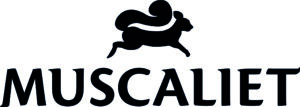
Judges’ Comments
Muscaliet Press, named after a mythical composite creature, imparts a slightly magical tenor to its pamphlets. They are usually tile-sized and all appear in unlettered and unpatterned covers, whose solid hues are chosen by the authors. The pamphlets often feature interplays of words and images; they are produced in short runs of 80-120 copies. Muscaliet Press exhibits the dignity of an actor who is tiny on the scale of our cataclysmic and cluttered world yet has the courage to bring clarity and beauty into that world, to hold space for its bewilderment, and to explore new creative possibilities.
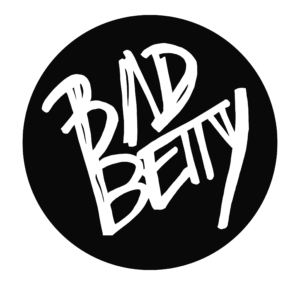
Judges’ Comments
In the five years since the press was established, Bad Betty has grown into a widely-respected publisher which specialises in showcasing new, exciting talent alongside well-established poets. The judges were unanimously impressed by the range of new voices in this year’s submission and the sheer daring and energy of their work. This was perfectly balanced by assured and impressive publications from established and highly-respected poets. Bad Betty pamphlets have a quite distinctive design – sleek, monochrome, minimalist, with eye-catching cover images and signature font style. We particularly admired the way the press actively promote their writers through quarterly events, a national readings tour and strong links with bookshops and stockists.
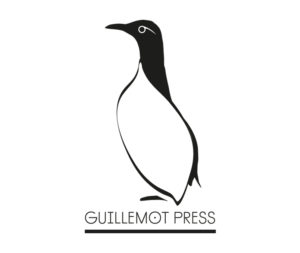
Judges’ Comments
All pamphlets submitted by Guillemot Press stood out for their beauty and craftsmanship. From covers full of character and individuality – and yet always recognisable as part of the publisher’s aesthetic – to the expert use of white space and the integration of images and collages to complement the poetry, Guillemot creates beautiful objects with care and attention. Their passion for the pamphlet form is evident, whether they’re publishing new writers, established poets or collaborating with artists and illustrators. Guillemot’s environmental engagement and experimentation with innovative materials further contributes to the creation of high-quality pamphlets, while championing sustainable publishing solutions.
The winner of the Michael Marks Award for Illustration will be announced at the event on Friday 9th December at the British Library. The winner of the Environmental Poet of the Year Prize will also read at the event.
(Please note that Friday 9th December is the rescheduled date for the event, because of nationwide UK rail strikes on the date we had originally planned)


